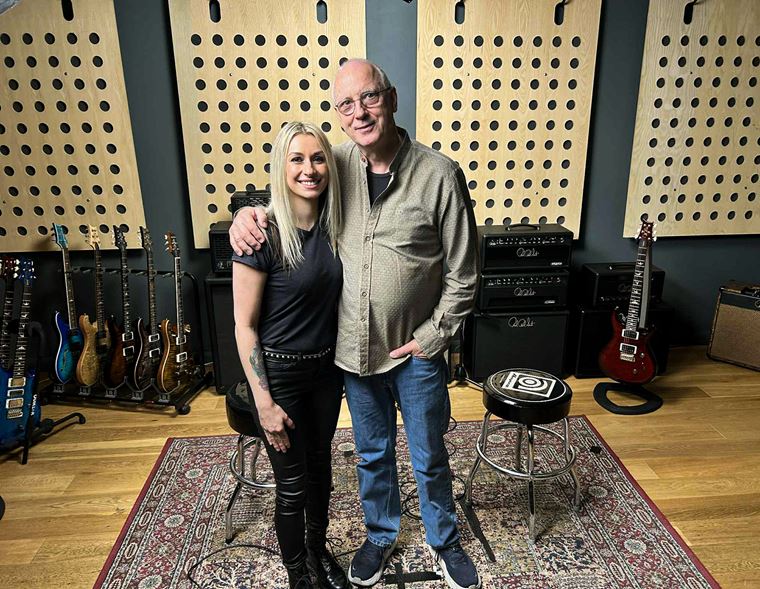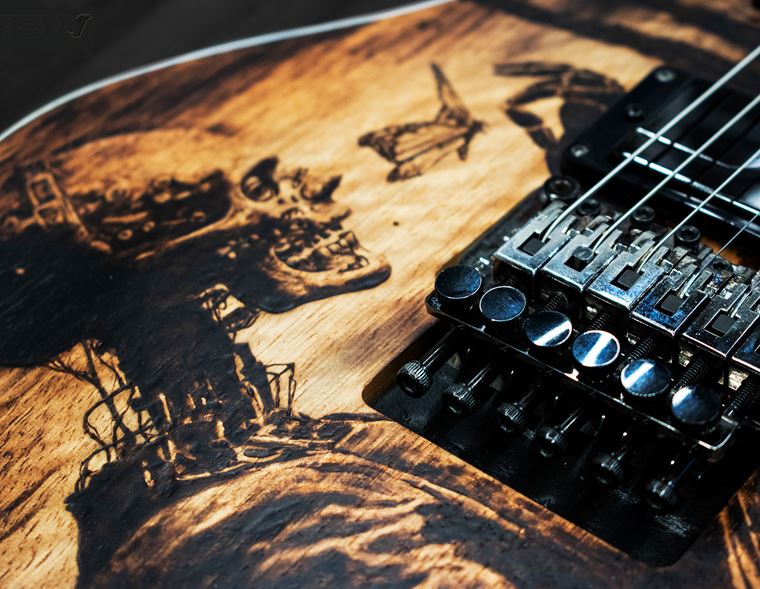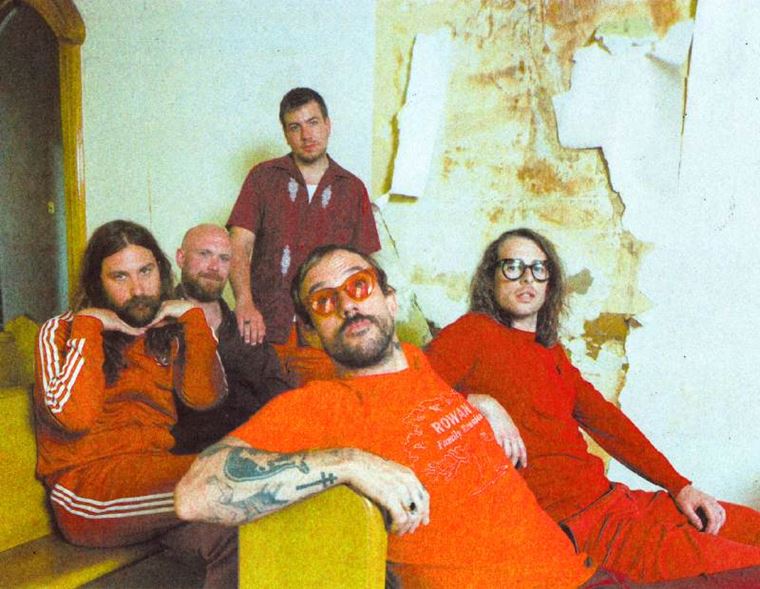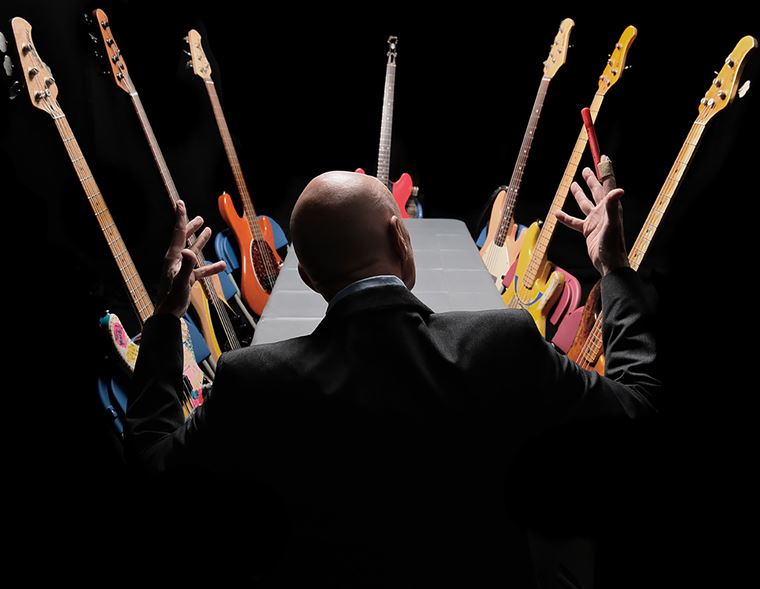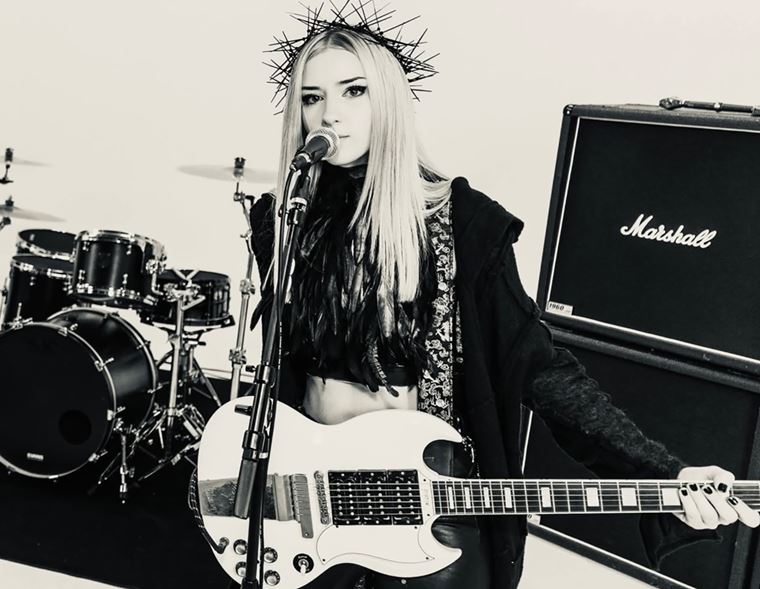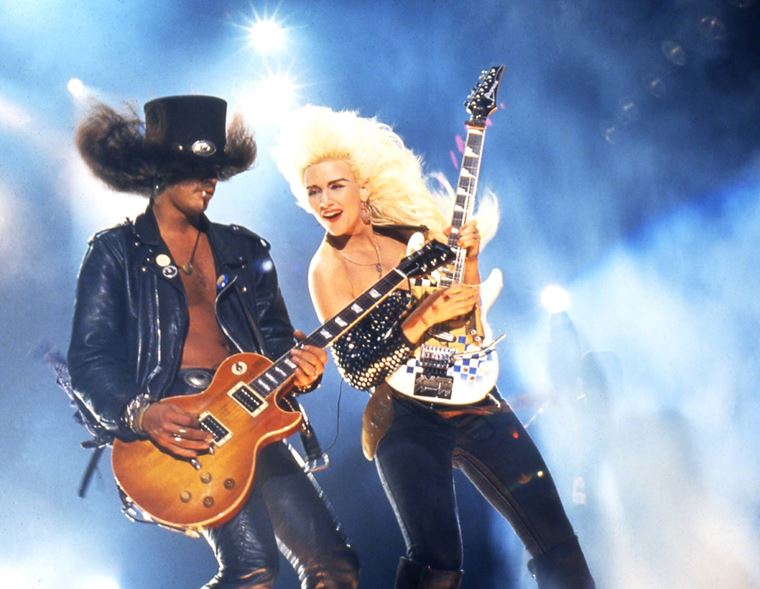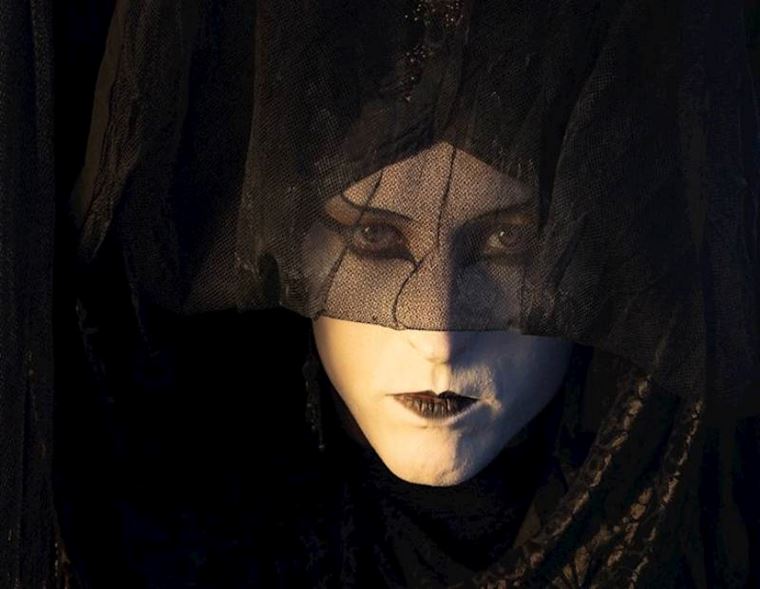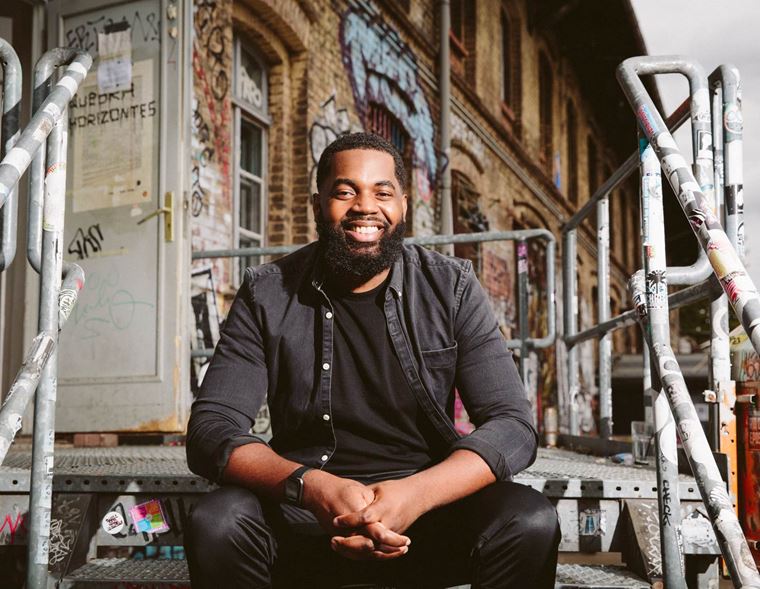Troy Redfern EXCLUSIVE Interview: Slide, Attitude and Playing a 100 Year Old Guitar
Troy Redfern is fast becoming the slide player to watch. Bringing a raw intensity to his molten brand of blues rock, Redfern is building a reputation for breakneck riffs and energetic performances that are blowing away audiences up and down the country. A self-styled outsider to the UK blues scene, Redfern is nonetheless dominating with his take-no-prisoners sound and a work ethic that is truly inspiring.
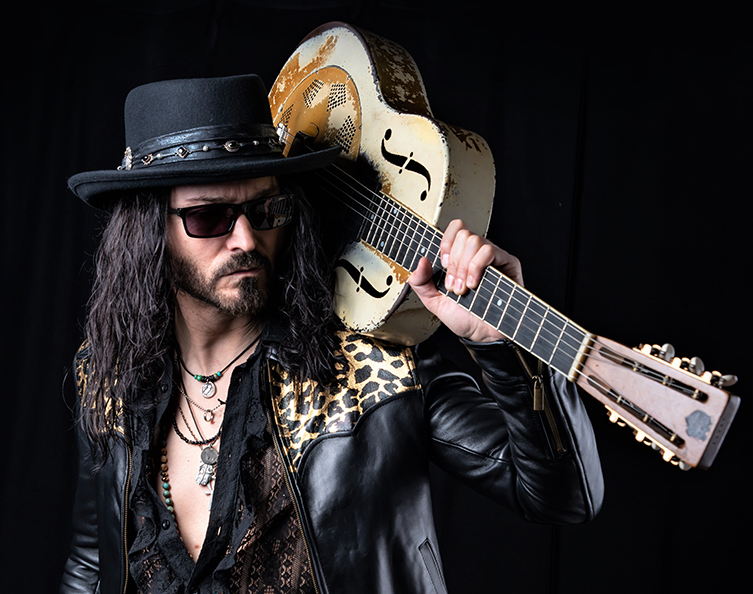
(photo: Will Carter)
Bringing a near century-old National resonator with him on his travels, Troy has spent the last half decade doing things the proper way: endless gigs and regular releases. It’s all starting to add up to a confident career, and his latest album, Wings of Salvation, is proof of how far he has come as a writer and player.
We naturally wanted to know more, and so caught up with him over Zoom to discuss slide technique, why limitations are good, and about how an authentic ‘voice’ in music is everything. But before all that, we somehow ended up chatting for ages about Frank Zappa…
Troy Redfern Interview
guitarguitar: So, we’re gonna chat guitars, slides, new records, all the good stuff!
Troy Redfern: Yeah, brilliant man.
GG: So, you’re well known for your slide playing. What got you into slide in the first place?
TR: I think I was about 17 and a girlfriend at the time’s dad was really into open tunings. He showed me some standard stuff: open major, some modal tunings, and just kind of opened that world up really. Slowly over the years I got into it, started playing slide with it. It’s just something that's grown over the years.
GG: Yeah, so you were already a guitar player and you already had a set of influences prior to the slide thing. Without shoehorning you into the blues, was the kind of blues-rock idiom something you were already into?
TR: Yeah, I started playing when I was 13 and early stuff was kinda like Hendrix and the Beatles. By the time I was 16 it was Frank Zappa, and that opened up a whole world of just everything: there’s blues in Zappa, avant-garde stuff, experimental music. So that moment of discovering Zappa was a huge thing. That introduced me to artists like Adrian Belew and Steve Vai, all of those guys.
GG: Oh, yeah! I’d be interested in hearing more about your ‘fandom’ with Zappa because there’s so much of his stuff out there, and listening to, say, Hot Rats will give you an entirely different experience to the likes of Ruben and the Jets. So, what was your Zappa angle?
TR: I think I got Musician magazine in 1991, and Steve Vai was on the cover. It was the Passion and Warfare era. I read about Zappa there, Joe’s Garage, so I went to the record shop - but when you had record shops! - and I bought Weasels Ripped My Flesh and Broadway the Hard Way. So I got either end: one was early Mothers of Invention and the other’s the last tour. I just absolutely loved it beyond anything I’d heard, so I started looking for interviews with Zappa, which was obviously harder in the pre-internet era. Everything resonated: his whole outlook, everything he was saying, and that continued so I started collecting all his albums. Yeah, it was pretty obsessional, my whole thing with Zappa.
These last two albums I’ve recorded have been in the blues rock genre, but on bandcamp, I have stuff tucked away which is kind of more experimental. I did an album called Thunder Moon, which is just guitar music but it’s genreless really. I love that as well.
GG: Interesting! And you mentioned Steve Vai and Adrian Belew. They both work within the rock idiom but they’re both quite…’mavericks’ is an okay term for both of them I think. Very inventive players, just like Zappa. So, is that something that’s been a bit of a thread for you, these players who are perhaps on the edges of the mainstream but who are still quite popular characters?
TR: 100%, yeah! Steve Vai kind of polarises, especially for blues guys who generally hate someone like that! But to me, it’s about ‘voice’ on an instrument and Steve Vai: someone could put a track on and you’d know it was him. I think the most important thing with any artist - whether it’s a painter or a musician - you want an identifiable expression.
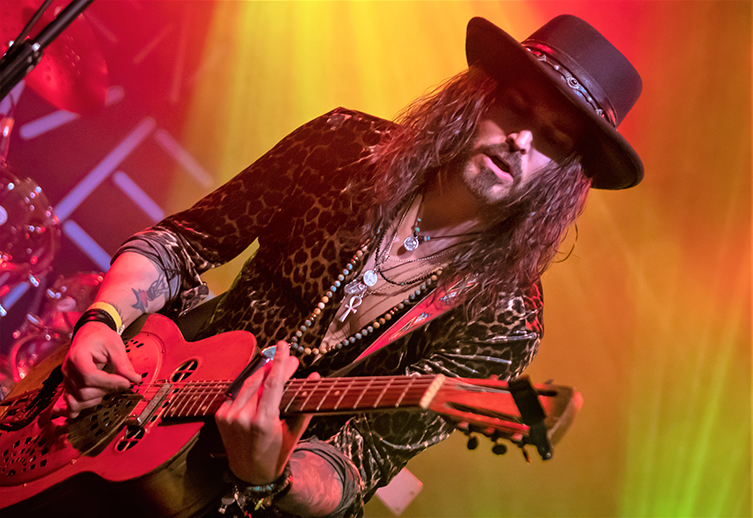
(photo: Will Carter)
GG: Certainly.
TR: Steve Vai and Adrian Belew certainly have. All those guys, you know? Terry Bozzio as a drummer, Vini obviously, so yeah, there was a huge impact. One of the early Zappa albums I got was the guitar album with all those improvised solos, and that had a big impact because, you know, I didn’t want to be someone who learned solos. It didn’t turn me on. One of my best friends at the time went to the Guitar Institute and when he came back, he could play anything, but it didn’t seem like art to me. If you want to be a great session player then yeah, obviously, but for me it’s about trying to hit on something that’s inspired and non-conscious as opposed to ‘well, you’ve learned your licks’ because that’s very conscious. I think you can tell with the Zappa thing that he’s obviously not worked all that out! It's all stream of consciousness, with a very good band behind you that can echo back ideas and all that kind of stuff.
GG: Okay, yeah! Listening to your guitar playing, it’s very high quality but you’re saying you’re not necessarily somebody who’d learn lots of other people’s solos in your formative years. When you’re going for a lead, what is your primary musical motivation for it? What are you trying to get across when you’re going for a solo?
TR: It depends on the context of the track. Generally, I do a high energy sort of blues rock so if there’s one thing, it’s intensity. I enjoy listening to intensity, so I think that’s probably what comes out. I like the way it feels when I see or hear that. If it’s a slow song, it can be about melody and getting something that’s soaring, but even in that, I like to feel some sort of tension in that.
GG: That’s a good word, Troy: intensity. With slide playing - and I’d love to hear your thoughts on it - but the margin for sounding ever so slightly off key or out of tune is obviously very high because a tiny increment ahead or behind the note means you aren’t quite there.
TR: Haha, yeah!
GG: Does that medium of slide guitar help you achieve the kind of emotional intensity that you want to get?
TR: It can do. It’s a bit like when I’m playing my Strat, I’m always using the whammy. In the same way that you’re coming up to notes in that Jeff Beck way, like you said, the way you slide into a note does feel more raw. There’s more string noise around it with the slide, so it’s a little bit hazy in its quality. There’s a rawness, as opposed to a pureness that you get with a Les Paul or a Strat.
GG: Yeah, it’s like you’re obliged to not just pick a single note and have it be the thing that’s played because of the nature of the instrument.
TR: Yeah.
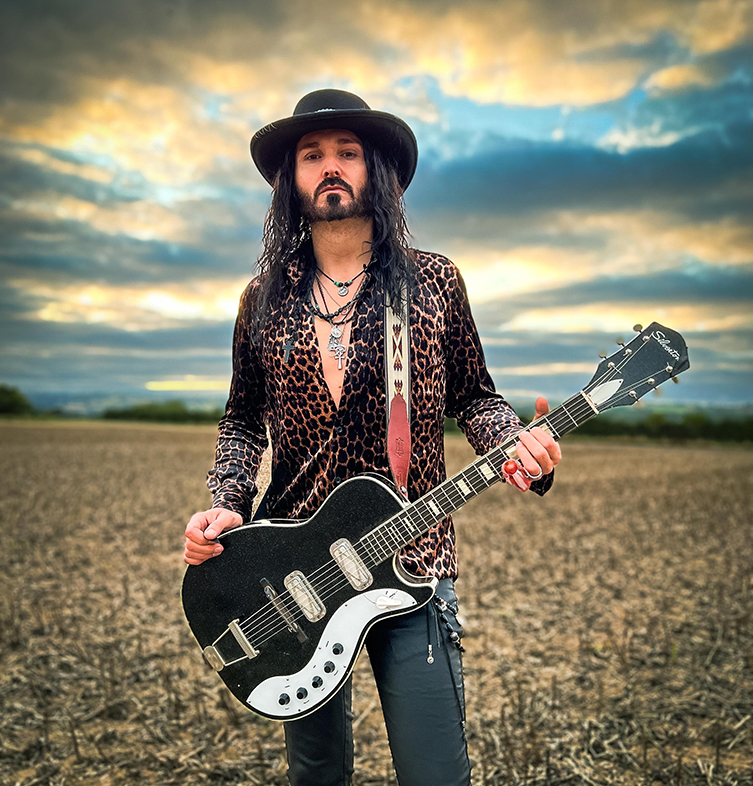
(photo: Alan Hargest)
GG: There’s a player expectation of having to work around what is perhaps a limitation of being a piece of glass or steel on your finger haha! That, in itself, can push your playing into a more intense place as a player.
TR: Well, there’s someone like Derek Trucks who is very pure and very precise and that’s a different thing, but I’ve always been attracted to Houndog Taylor or Fred McDowall because those guys are not lick masters - they haven’t got tons of chops going on, but whatever they do play has got a voice. A voice and massive identity, with minimal notes, like Albert Collins. He doesn’t do much but my god, the sound and personality he’s got in his playing - which I’m sure he wasn’t even thinking about - that’s what I’m interested in, more than technique and more than anything else.
GG: Yeah, absolutely! Now, I’ve seen two main resonators of yours, is that right? Two old Nationals?
TR: One National, a 1929 Triolian. It was originally brown but this stuff (Troy reaches for the guitar and points out some white finish work that is heavily distressed), you put your nail under it and it comes off. The necks are really quite thin: I don’t know if this has been worked on in the past but it’s not very chunky in the hands, which feels great.
That’s the main guitar I write with, and I tune that to C-G-C-G-C, with a D on the top.
"When I was putting out my instrumental album, I was thinking, 'Am I doing the right thing?' Weirdly, that one sold the most and got played the most!"
GG: Ah, so is that basically Open C but with the top one down one step?
TR: Yes, and they are quite light strings. I’ve got 13s on here. Resonator players would generally use 16 in E tuning!
GG: Yeah!
TR: So this is down in C and has 13s but it kinda holds the notes, and I mainly play through an amp so I’m using an old Barcus Berry pickup. They are the only pickups, I find, that you can use with high gain without it feeding back. Most resonators players want that vintage sound but generally, I’m playing this like an electric guitar and the Barcus Berry - they don’t make them anymore but you can find them - they handle it and don’t feed back.
They’re solid, they’re like tanks and it’s a vintage guitar but I’ve been touring it and they don’t go out of tune. Obviously if you dropped it on its head, the weight of the body would snap the headstock (laughs) but other than that, I think they’re solid. The thing is probably to keep your eye on them, and make sure they don’t get stolen! That’s the only thing you’d worry about with these!
GG: Yeah, good point! So that particular model: is that one you went looking for specifically?
TR: I wanted one with that white finish for years and one came up on reverb in Germany. I had to jump on it! When very specific items come up like that - as you know - if you don’t jump on it, you’re not gonna see one for maybe ten years.
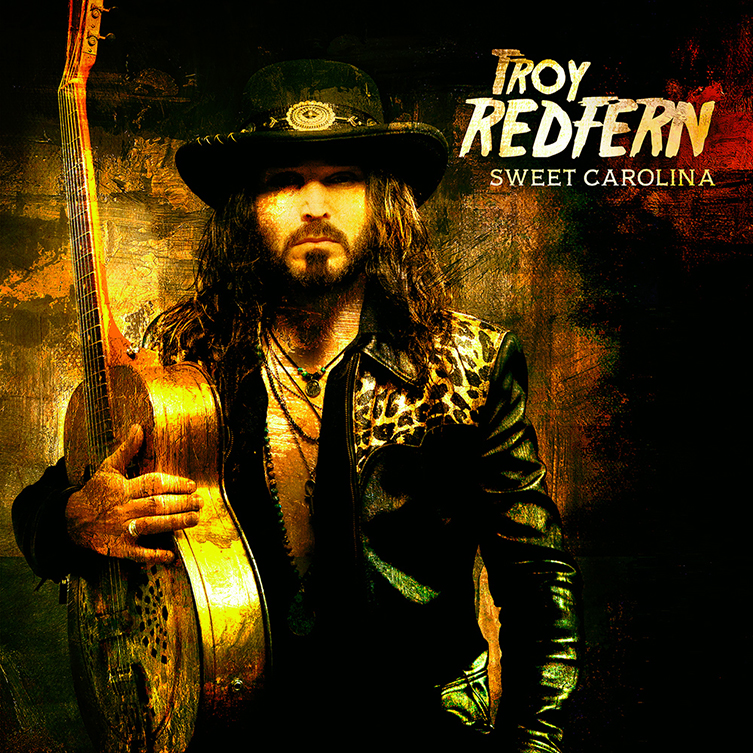
GG: Oh, for sure!
TR: I’m so pleased, because I’ve written the last two albums on that. That tuning gives off ideas endlessly, so yeah, I’m so glad I have that one.
And yeah, the other one is the Dobro M-32, 1935, with a slotted headstock. I ripped a gold foil pickup out of a Harmony Bobcat, an original sixties one, and put it on here. Again, this thing rips: I’ve got it in Open D. So if I’m doing tours, I’ll be taking those two out, if it’s solo or as a duo. Obviously, when I go out as a full band, I’ll take the standard tuned guitars too, for the songs. As a duo, I think the open tuning works because you’ve got the sympathetic strings for a bigger sound.
GG: Yeah, good point. See on your main guitar, is that Barcus Berry pickup a humbucker? Like, a magnetic pickup?
TR: Yeah but they’re just super thin. They’re very shallow so they can get under the strings. They’re expensive pickups but they are the only ones that do that sound. If you’re after that sound, with gain, you need these.
"You can always work around feedback, even if it's difficult. All that's gonna happen is that your strings are gonna come alive! You just have to adapt."
GG: Okay, I get you. Talking about gain, because that’s obviously a big part of your sound, I wondered: do you ever encounter issues with stage sound problems? Like, guitar feedback howling away when you don’t want it to? And do you have ways of counteracting that?
TR: Yeah definitely. In December, I bought a Magnatone Twilighter 2x12 and with the amp I was using before - a Peavey Classic 50 - if I had the amp behind me and kind of angled slightly away from me, that seems to work. Directly behind me is a problem. If I’m doing a support slot, it’s a bit tricky because you’ve got a limited amount of room but you can always work around it, even if it’s difficult. All that’s gonna happen is that your strings are gonna come alive, a bit like a Sustainer guitar. You just have to adapt.
GG: You can use that sound to dictate your playing a wee bit.
TR: Yeah.
GG: Cool! So in terms of pedals, are there any essentials that you really need to have at your feet to make your sound happen?
TR: Yeah, the rhythm sound is always an 80s Rat, a black face one.
GG: Oh cool! Great pedal!
TR: I think it’s an 87, the one I’ve got. I’ve tried swapping in other things but they are such great pedals. Everyone equates them with hair metal but they are super versatile. On top of that, as a booster, I used a Hermida distortion. It’s like the Zen drive with more gain, and that’s been on the pedalboard forever. Then I’ve just got a BOSS DD-7, an Akai Headrush 2 looper, so I can switch between the looper and a delay on that. On the recordings, there’s not much delay, but when I play live, I like the sound to be wet so there’s a lot of special stuff going on.

(photo: Will Carter)
GG: Got you! Nice. One thing I’m always interested about - and I wonder how it comes into play with the thickness of your strings - what type of pick do you prefer using?
TR: I use a Dunlop Sharp, 1.35mm. I like the sharper point less from my resonator playing and more from my other guitar playing. I’ve always liked having just a tiny bit of a point sticking out. You get so used to that! If I use a rounded pick, it doesn’t feel right and I can’t attack the notes right. It’s a pain, really! (laughs)
GG: Yeah, I can imagine! Now, when I was checking out your work, I heard that in 2020, you recorded FIVE albums!
TR: I released five albums!
"For me, Wings of Salvation is just a solid album of possibly the strongest songwriting I've done to date."
GG: That’s quite a lot! I know the pandemic was on, but did you also just have loads of material stockpiled on your hard drive?
TR: Yep, that’s exactly what happened! I’m kind of an obsessive recorder, so I archive tracks, record stuff, save it to the hard drive in folders. There’s a lot of stuff! I had a tour just before the pandemic, so I released the first album in February, then we got shut down in March so I immediately wrote an album called Islands. That took about a month. Then, I thought, to get everything moving along, I’ll release an album every two months, for Bandcamp Fridays. So I just found stuff on the hard drive! That was where that instrumental album I mentioned earlier came from. I recorded it because I wanted to hear it, but never planned to release it. When I was putting it out, I was thinking, ‘Am I doing the right thing?’, because my whole thing has been blues rock, and this could completely throw people. Weirdly, that one sold the most and got played the most! That was really interesting: it meant that, instead of worrying about taking a left turn at any point, I have the option of doing something different and kind of going with it.
GG: That is really interesting, Troy. Often, when you’re starting your career and getting established, you get told to ‘niche down’ and concentrate on one particular vibe for your music, your look, everything. Your brand, basically. You’ve proven otherwise! Does that confuse things for your future?
TR: It does a bit. There’s an album I’ve always wanted to make that is more Zappa-influenced. I’m not gonna rip him off in any kind of way but that genreless kinda ‘just about the notes’ album is something I’m gonna do at some point. Whether or not I release it in the same way, it’ll obviously be more niche. But as you said, releasing Thunder Moon and having it get a good response makes me think that maybe people will come along with that, you know?
GG: I hope they do, because even though we all have the entire universe of music available to us - and I’m sure I don’t need to hear, I dunno, the Smashing Pumpkins playing reggae (laughs) - it’s nice that artists can be allowed to bring in more diverse influences. We’re all more three-dimensional than reductive marketing might otherwise paint us. Even in your blues rock, you might be informed by genres that have nothing to do with it.
TR: Yeah, and within the blues scene, I’m kind of on the edge of that scene in my mind. I don’t play Stevie Ray Vaughan licks or anything like that. You hear those influences a lot and that’s never interested me. It really hasn’t. Again, goin back to the thing about expression: if you’re expressing yourself through ideas that someone has put out there before, are you really expressing yourself? It’s that thing. It’s a tricky one because there are others who say you’re keeping that tradition alive, so who knows? I wouldn’t call my licks ‘blues standards’.
GG: Absolutely, and it’s probably fair to say that with most of the stuff you’ve released, there’s one foot in that world you’re talking about being an outside member of. There’s still one foot on there and another foot elsewhere.
"I think the most important thing with any artist - whether it's a painter or a musician - is that you want an identifiable expression."
TR: Yeah.
GG: It’s kind of almost like Mark Lanegan, you know his stuff?
TR: Yeah, he did some really unusual stuff, completely in his own world, different from anything else that’s going on. That’s an interesting place to be, probably a scary place, too! Hard to market, maybe? He was lucky in that he already had an audience from being in Screaming Trees, probably.
GG: Yeah, exactly. He came to mind because he used to say things like - and I’m badly paraphrasing here - but he’d say, ‘I want to take the soul and the spirit of blues music, but I’m not really interested in playing blues because it’s very well trodden and sometimes a bit boring’. I understand entirely what he meant by that. He used synths and drum machines alongside guitars and so on. Although as artists you two are nothing alike, the attitude seems similar: it’s the energy of the blues without necessarily having to play the Crossfire riff over and over until your fingers fall off!
TR: (laughs) You’re exactly right man, that’s exactly how I think! I just want something that has a stamp of identity on it, whatever that is. A voice, and that can be…a tuning can do that. Tuning like that and then writing in that tuning gives it a voice, do you know what I mean? It limits you because you don’t know all the chords on the guitar, and limitations are a good thing. It’s like, if you have a ton of software plugins, it’s like which one do you use? But if you’ve got five of them, you just get on with the process of making music.
It’s the same with guitar scales. You can know all the sales, but then what are you writing? What are you trying to do?
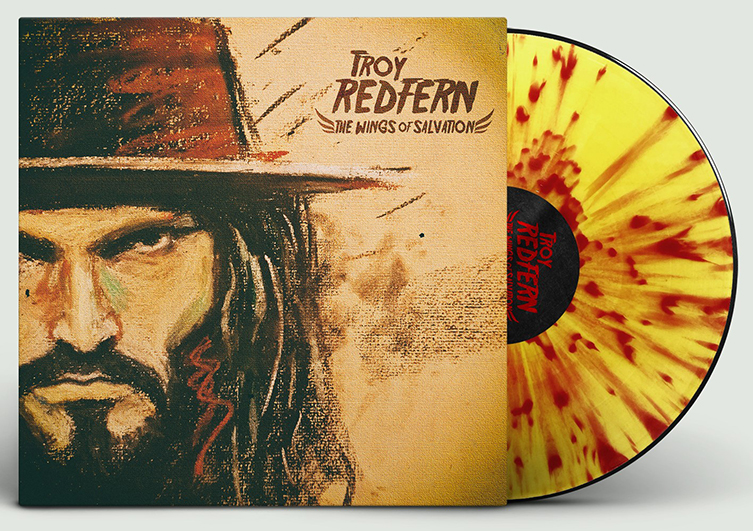
GG: Yeah, use what you know! Now, we haven’t even spoken about your new record, Wings of Salvation yet! What can fans expect this time?
TR: I recorded the album in four weeks, February to March, so it was a quick process. We got Paul Stewart from The Feeling on drums, he’s an absolute monster. Dave Marks produced it and played bass. I just think, for me, it’s a solid album of probably the strongest songwriting I’ve done to date. That’s how I feel about it. I think having that pressure of recording in that time limit just really focussed everyone, so it was great. So if you like sort of left-field blues rock, give it a spin!
Troy’s new record, Wings of Salvation, is out now. He’s constantly on tour, so keep an eye on the official Troy Redfern website for tour dates, news and of course to pick up the new record!
We’d like to thank Troy for his time, and to Peter Noble for putting us in touch.
For more interviews, please click through to the guitarguitar interviews section, where you’ll find exclusive interviews with Steve Vai, Joe Bonamassa and many more!


